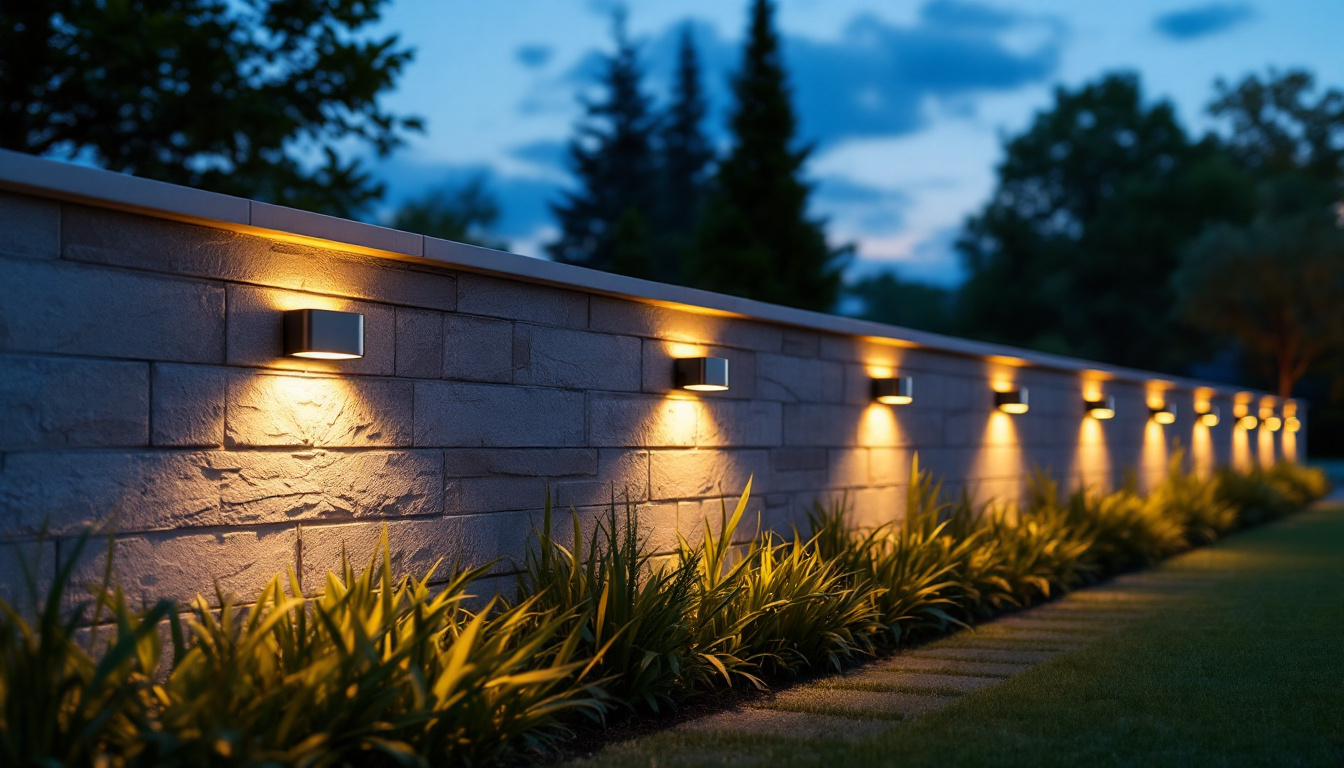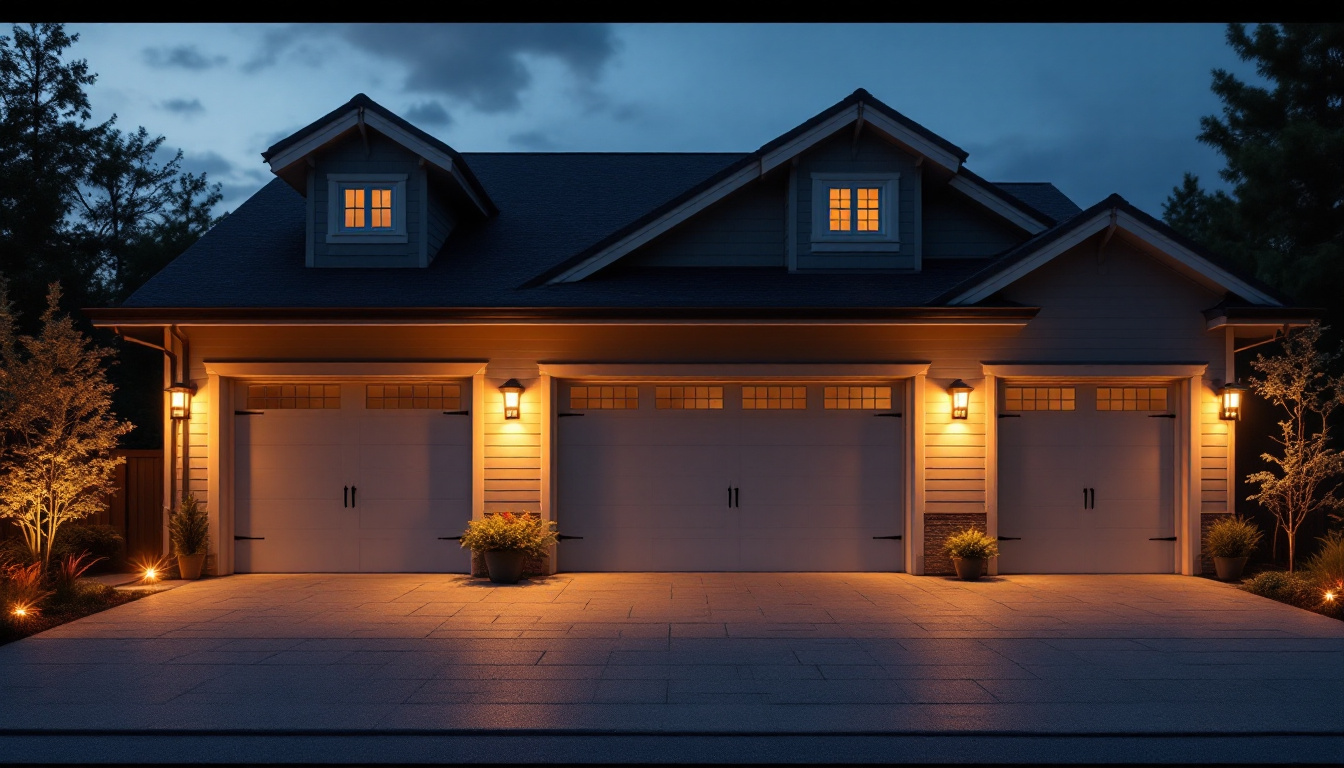
As the demand for sustainable energy solutions continues to grow, outdoor solar lights have emerged as a popular choice for both residential and commercial properties. For lighting contractors, understanding the intricacies of these solar-powered fixtures can provide a competitive edge. This article delves into the essentials of outdoor solar lights for walls, offering insights and strategies for contractors to master this niche.
In recent years, there has been a significant shift towards renewable energy sources, with solar lighting leading the charge in outdoor illumination. This trend is driven by several factors, including environmental awareness, cost-effectiveness, and technological advancements.
solar lights harness the sun’s energy, converting it into electricity that powers LED bulbs. This not only reduces dependency on traditional power sources but also lowers energy costs for homeowners and businesses alike. As a lighting contractor, recognizing the benefits of solar lighting can enhance your service offerings and attract environmentally conscious clients.
At the core of solar lighting technology are photovoltaic (PV) cells, which convert sunlight into electricity. These cells are typically housed in solar panels that are mounted on the light fixture or nearby. When selecting solar lights for wall applications, it is crucial to understand the efficiency of these cells, as this directly impacts the performance of the lights.
Additionally, the battery storage system plays a vital role in the functionality of solar lights. Most solar lights come equipped with rechargeable batteries that store energy collected during the day, allowing the lights to operate at night. The capacity and quality of these batteries can greatly influence how long the lights will shine after sunset. Furthermore, advancements in battery technology, such as lithium-ion batteries, have improved the longevity and efficiency of solar lighting systems, enabling them to perform better in low-light conditions or during extended cloudy periods.
Outdoor solar lights offer a multitude of advantages that make them an appealing choice for both contractors and clients. Firstly, they are easy to install since they do not require wiring or extensive electrical work. This can significantly reduce installation time and costs.
Moreover, solar lights are environmentally friendly. By utilizing renewable energy, they contribute to a reduction in carbon footprints. This aspect is particularly attractive to clients looking to promote sustainability in their properties. In addition to their eco-friendly nature, solar lights often come with features such as motion sensors and timers, which enhance their functionality and energy efficiency. These features not only provide security by illuminating pathways and entryways when movement is detected but also help conserve energy by ensuring lights are only on when needed.
Lastly, solar lights can enhance the aesthetic appeal of outdoor spaces. With various designs and styles available, they can complement any architectural theme while providing functional illumination. From sleek modern fixtures to charming vintage lanterns, the diversity in design allows homeowners to express their personal style while benefiting from the practical advantages of solar technology. Furthermore, many solar lights are now equipped with smart technology, enabling users to control their lighting remotely via smartphone apps, adding an extra layer of convenience and customization to outdoor lighting solutions.
When it comes to selecting solar lights for wall applications, several factors must be considered to ensure optimal performance and satisfaction for clients.
Firstly, the brightness of the lights is crucial. Measured in lumens, the brightness level should match the intended use of the area being illuminated. For instance, pathways may require lower lumens, while security lighting may necessitate brighter options.
Proper installation is key to maximizing the effectiveness of solar lights. Lighting contractors should assess the location of the lights to ensure they receive adequate sunlight throughout the day. Areas that are shaded by trees or buildings may not provide sufficient energy for the lights to function optimally.
Additionally, the height at which the lights are mounted can influence their performance. Generally, solar lights should be installed at a height that allows for maximum exposure to sunlight and adequate illumination of the desired area. It is also important to consider the angle of installation; tilting the lights slightly towards the sun can enhance their charging efficiency, especially in regions with varying sunlight exposure throughout the year.
Solar lights come in a variety of designs, from sleek modern fixtures to more traditional lantern styles. When advising clients, it’s essential to consider the architectural style of the property and the overall landscape design. Choosing lights that harmonize with the existing aesthetics can enhance the property’s curb appeal.
Furthermore, color temperature can also affect the ambiance of outdoor spaces. Warmer tones create a cozy atmosphere, while cooler tones can offer a more contemporary feel. Understanding these nuances can help contractors make informed recommendations to clients. Additionally, the material of the solar lights plays a significant role in both durability and style. Options range from stainless steel and aluminum, which offer a modern look and resistance to weather elements, to more rustic materials like wrought iron or wood, which can complement traditional settings beautifully. Selecting the right material not only affects the visual appeal but also the longevity of the lights, ensuring they withstand the test of time and environmental factors.
While solar lights are relatively low-maintenance, certain practices can prolong their lifespan and ensure consistent performance. Regular cleaning of the solar panels is essential, as dirt and debris can hinder their ability to absorb sunlight. A simple wipe with a damp cloth every few weeks can significantly improve efficiency, especially in areas prone to dust or pollen accumulation. Additionally, seasonal inspections can help identify any potential issues before they escalate, allowing for timely repairs and adjustments.
Additionally, contractors should educate clients about the importance of checking and replacing batteries when necessary. Over time, batteries may lose their ability to hold a charge, which can diminish the brightness and duration of the lights. Providing clients with a maintenance schedule can enhance their satisfaction and extend the life of the installation. It’s also beneficial to inform clients about the different types of batteries available, such as nickel-metal hydride (NiMH) or lithium-ion, as these can vary in performance and longevity, impacting the overall efficiency of the solar lights.
Even with proper installation and maintenance, issues may arise with solar lights. One common problem is insufficient brightness, which can often be traced back to inadequate sunlight exposure. Contractors should encourage clients to regularly assess the location of their lights and make adjustments if necessary. Factors such as overhanging trees or nearby structures can cast shadows, significantly reducing the amount of sunlight the panels receive. Clients might also consider repositioning lights to more optimal locations or even adding reflective surfaces to enhance light distribution.
Another issue may be the failure of lights to turn on at night. This could indicate a problem with the battery or the solar panel. Educating clients on how to troubleshoot these common issues can enhance their experience and build trust in the contractor’s expertise. For instance, clients should be advised to check the settings on their solar lights, as some models come with adjustable brightness levels or timers that may inadvertently be set incorrectly. Furthermore, encouraging clients to monitor the performance of their solar lights over time can help them recognize patterns and identify when professional assistance may be needed, fostering a proactive approach to maintenance.
To successfully promote solar lighting services, contractors must effectively communicate the benefits and features of these products. Highlighting the cost savings associated with reduced energy bills and the environmental benefits can resonate with potential clients.
Utilizing social media platforms and online marketing strategies can also help contractors reach a wider audience. Showcasing completed projects through before-and-after photos can demonstrate the transformative power of solar lighting and attract new customers.
Establishing strong relationships with clients is essential for long-term success in the lighting industry. Providing exceptional customer service, including follow-up consultations and maintenance reminders, can foster loyalty and encourage referrals.
Additionally, offering educational resources about solar lighting can position contractors as experts in the field. Workshops or informational sessions can empower clients with knowledge, making them more likely to choose solar solutions for their lighting needs.
The solar lighting industry is continually evolving, with new technologies and products emerging regularly. Contractors should stay informed about the latest trends and advancements to remain competitive. Participating in industry conferences, webinars, and training sessions can provide valuable insights and networking opportunities.
Moreover, subscribing to industry publications and following relevant online forums can help contractors stay ahead of the curve. By being knowledgeable about the latest innovations, contractors can offer clients the best possible solutions tailored to their needs.
Outdoor solar lights for walls present a unique opportunity for lighting contractors to expand their service offerings and tap into the growing demand for sustainable solutions. By mastering the intricacies of solar technology, installation best practices, and effective marketing strategies, contractors can position themselves as leaders in this niche market.
As the industry continues to evolve, embracing innovation and prioritizing customer satisfaction will be key to achieving long-term success. With the right knowledge and approach, lighting contractors can not only meet but exceed client expectations in the realm of outdoor solar lighting.
Ready to elevate your lighting projects with the most sustainable and cost-effective solutions? At LumenWholesale, we provide lighting contractors like you with the highest quality, spec-grade outdoor solar lights at unbeatable wholesale prices. Say goodbye to local distributor markups and hello to a vast selection of reliable, high-performance lighting that meets the highest industry standards. Plus, with free shipping on bulk orders, you can stock up on premium lighting without any hidden fees or compromises. Don’t miss out on the perfect combination of quality, affordability, and convenience. Discover wholesale lighting at the best value today and light up your clients’ spaces with confidence and style.

Discover how lighting contractors are transforming spaces with garage outdoor light fixtures through real-world success stories.

Discover the origins of the term “gaslighting” and learn how understanding its history can boost efficiency for lighting contractors.

Discover why outdoor lighting sconces are a must-have in every lighting contractor’s toolkit.

Discover the essentials of square LED recessed lighting in just five minutes.